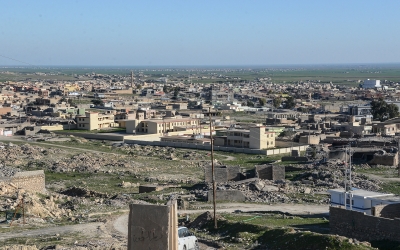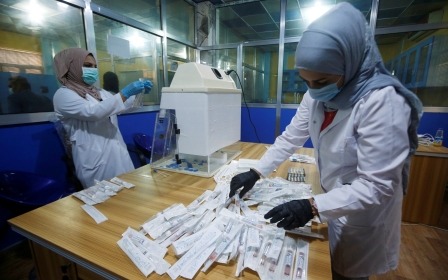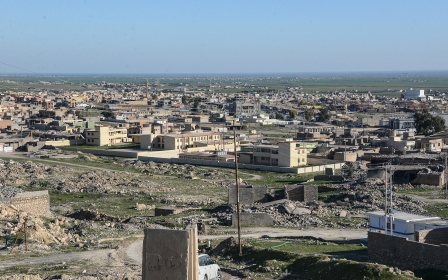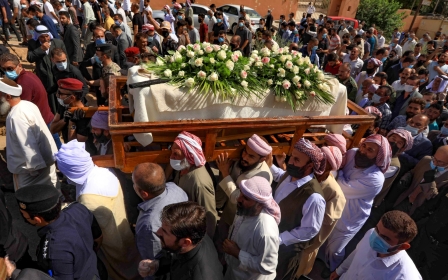Iraq: Mass funeral of Yazidi victims of Islamic State brings back grim memories
As the remains of more than 100 Yazidis murdered by the Islamic State (IS) group were returned to their village in the Sinjar district of the Nineveh governorate to be buried, years after the militant group swept through northern Iraq, local activists expressed hope there might finally be an opportunity for the survivors to begin healing old wounds.
Hundreds of residents of the village, as well as local and federal officials, clerics, representatives of humanitarian organisations, international missions and journalists, lined the streets of Kojo on Saturday as the remains of 104 Yazidis killed by IS in August 2014 were carried to their final resting place.
Among those watching was activist Farhan Ibrahim. He stood on the edge of the main street that cuts through the village and watched as mourners, most of whom wore black suits and white traditional Yazidi uniforms, walked in parallel carrying the coffins wrapped in the Iraqi flag.
The bodies had recently returned from Baghdad after the completion of examination and identification procedures.
Silence dominated the scene, interrupted only by the steps of the mourners, the murmurs of the victims' families, weeping, and the tambourines beaten by the folk-band players who accompanied the convoy, playing funeral melodies.
New MEE newsletter: Jerusalem Dispatch
Sign up to get the latest insights and analysis on Israel-Palestine, alongside Turkey Unpacked and other MEE newsletters
Ibrahim shook his head, trying to ease the memories of what happened the day the militant group came to the area and, according to officials, carried out the third-largest massacre that occurred during their brutal campaign.
On the evening of 2 August 2014, the autonomous Kurdistan Regional Government (KRG)'s Peshmerga forces were deployed throughout the city of Sinjar, accompanied by a few dozen Yazidi volunteers, who were armed with nothing more than AK-47s.
The IS attacks were concentrated in the southern suburbs of Sinjar district, the biggest stronghold of the Yazidi religious minority in Iraq and the region.
Events began to accelerate hours later, and suddenly the Peshmerga disappeared "without a fight", according to Ibrahim. Yazidi volunteers remained alone trying to obstruct the advance of the militants pouring into the district from all directions.
"At 7am the next morning, the armed resistance was completely silent, as there were no forces or volunteers," Ibrahim told Middle East Eye.
"Everyone was certain that they would inevitably perish," so tens of thousands of Yazidis took to streets heading towards the nearby Sinjar mountain.
"The mountain was 25-40km away, depending on the location of the village or the compound from where they left. The families that owned cars survived, but those who were walking on foot fell into the grip of the militants."
The militants were travelling in dozens of modern Toyota pick-ups, and their hunt for the Yazidis was easy, especially in chasing down those who were on the roads.
"The gunmen killed or kidnapped anyone who could not reach the mountain that day. The streets were full of bodies, and the cars were full of the kidnapped."
Kojo, 21km south of Sinjar, had yet to come into contact with IS. The militants were preoccupied with the district of Sinjar and its four large suburbs at this stage, but eventually they headed south so they could "finish off the Yazidis once and for all".
The militants blocked the road between Kojo and Mount Sinjar, and besieged the village for 11 days before deciding to storm it and turn it into a scene for mass executions of the Yazidi men and old women who refused to convert from the Yazidi religion to Islam, survivors told officials and reporters later.
By 15 August, at least 2,700 Yazidi men had been killed, more than 6,400 women and children had been kidnapped, 350,000 had been displaced and more than 80 mass graves were dug to bury the Yazidi victims.
Despite many words of support from Baghdad and the KRG, some locals are sceptical there will be real compensation or justice.
"We are peaceful people, and we do not have enmities with anyone," Zaid Hajai, a Yazidi, told MEE.
"We do not believe in revenge and bloodshed in retaliation for what we have suffered. We want to obtain our rights by law because blood in exchange for blood will not solve the problem."
Return to Sinjar
Although five years have passed since the liberation of Sinjar and the expulsion of IS, only 20 percent of its residents, most of whom live in camps for the displaced on the mountain and in the KRG governorates of Dohuk and Sulaymaniyah, have returned, local and federal officials told MEE.
The "most fertile" area in the region and the highest, lying close to the Iraqi-Syrian border strip, is one of the hotspots of conflict between local and regional parties, and the genocide its inhabitants faced is at least partly the product of unresolved religious, social and geopolitical tensions which have existed for many decades.
Before 2003, Sinjar was a safe haven for those opposed to former ruler Saddam Hussein, who made it part of his campaigns for demographic change and Arabisation that affected most areas with a Kurdish majority in the north and the Shia majority in the south.
'The governments of Baghdad and Erbil did not provide us with anything, and the modest services obtained by the people of Sinjar are a product of the work of international civil society organisations in Sinjar'
- Farhan Ibrahim, survivor
Later, when the US led an international military coalition to topple Saddam and the Kurds and Shia ascended to power, the Kurdistan Democratic Party (KDP) took control of Sinjar and the surrounding areas. But who should officially control the region is disputed by Baghdad and the KRG.
Gradually the area turned into a safe haven for the Kurdistan Workers' Party (PKK) and allied Syrian Kurdish movements opposed to the government of Bashar al-Assad.
The location of Sinjar in the heart of a range of conflicts - between Baghdad and the KRG, between the KDP and its ideological opponents the PKK, between Baghdad and Ankara and between Damascus and Ankara - has deepened the feeling among Yazidis that they are "a commodity that every party trades" in favour of its interest.
Displaced Yazidis speaking to MEE said this was the main factor that prevents them from returning home. The myriad conflicts in the region have turned peaceful Sinjar into a camp for Kurdish, Turkish, Shia, Turkmen and Yazidi armed factions.
Settling scores
Turkey, which has been fighting the PKK since the 1980s, "found it an opportunity to settle its scores" with its Kurdish, Shia and Syrian opponents all at once, a federal Iraqi official told MEE.
Since March 2017, Ankara has been bombing the region from time to time under the pretext of pursuing its opponents who use Sinjar as a haven.
The government of Baghdad, in an attempt to neutralise the region, last October signed an agreement it described as "historic" with the KRG to remove the PKK and other armed factions from Sinjar and place it exclusively under the protection of Baghdad.
The agreement, which was supervised by the United Nations Mission in Iraq and signed by Baghdad and the KRG on 1 October, aimed to "restore stability and normalise the situation in the Sinjar district", as a written copy obtained by MEE shows.
According to what is called the "Sinjar Agreement", the local police, national security and federal intelligence services are exclusively responsible for securing Sinjar, provided that all other armed formations are removed outside the boundaries of the district, and the presence of PKK in the district and the surrounding areas is ended.
But many locals have little confidence anything will change because of the agreement.
"The governments of Baghdad and Erbil did not provide us with anything, and the modest services obtained by the people of Sinjar are a product of the work of international civil society organisations in Sinjar," Ibrahim said.
"Even the agreement they signed did not provide us with anything. All the two governments [Baghdad and KRG] are trying to do is satisfy the international community and convince it that they have succeeded in solving the Sinjar problem."
He said that many of those responsible for the 2014 genocide, which saw more than 5,000 Yazidis killed, are still walking free, referring to Sunni Arab tribal leaders who allied with IS at the time.
"Until today, the Yazidis have not received any guarantees indicating that they will not face another genocide like the one they faced in 2014," he said.
"We believe that the government [Baghdad] may withdraw at any moment according to an agreement it concludes with Kurdistan or elsewhere and leaves us victim to any party that carries extremist ideas."
Families encouraged to return
The Sinjar Agreement entered into force in early December, when most of the armed factions left the city and handed over their headquarters to the federal police, which formed an internal cordon around the city in conjunction with the Iraqi army.
The mostly Shia Hashd al-Shaabi paramilitary groups and the associated Sinjar protection forces were stationed surrounding the outside, while the Federal Border Guard took over the task of securing the Iraqi-Syrian border, officials said.
According to the agreement, Sinjar will have its own local police, which will consist of 2,500 policemen, who will be recruited exclusively from the people of Sinjar, provided that the largest share is for the displaced, survivors and their families, and that they will be trained and equipped exclusively by the central government.
Federal security sources told MEE that these forces were ready and that they will take over their positions inside Sinjar next week. IS, which considers the Yazidis infidels, destroyed most of their housing compounds and villages in the southern and northern regions of Sinjar, while the military operations led by Iraqi forces and the US-led international coalition forces to liberate the city destroyed part of what remained.
Reconstructing Sinjar's towns and villages and cleaning them of war remnants is one of the most important items agreed on by Baghdad and the KRG to encourage the displaced to return to their areas.
"Most of the families are afraid to return to the area, but the return of calm gradually day after day and the start of cleaning the area and its reconstruction will encourage them," said Hajai.
"The security situation is currently relatively stable, especially after signing the agreement and controlling the security situation on the border strip. We still need a lot to normalise the situation in Sinjar, but things are promising and many families are thinking of returning."
Middle East Eye delivers independent and unrivalled coverage and analysis of the Middle East, North Africa and beyond. To learn more about republishing this content and the associated fees, please fill out this form. More about MEE can be found here.





